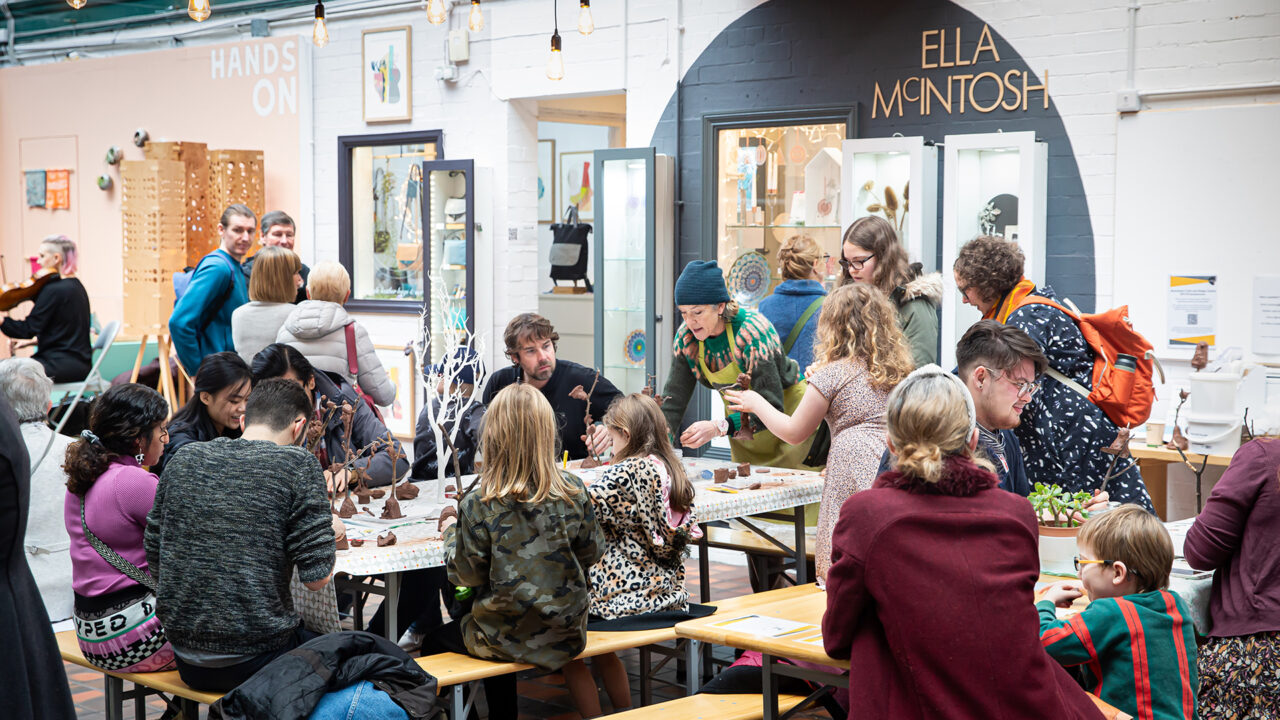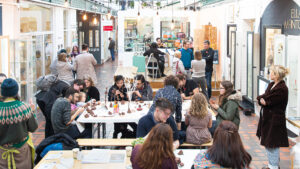- Posted on January 16th, 2024
Manchester Craft and Design Centre – Improving Energy Efficiency and Supporting Local Communities

A case study from Manchester Craft and Design Centre – a setting for artists’ studios with contemporary jewellery, ceramics and art for sale.
Aims of Manchester Craft and Design Centre
Our biggest challenge at the Manchester Craft and Design Centre is the fact that we are a 150-year old building that was built originally as a fish and poultry market. It was never intended to be a craft centre holding multiple studios, a café, workshop and community hub so the hurdles have been great and many. Particularly from an operational and environmental point of view.
As the need for sustainability becomes more essential by the day, we felt that it was our responsibility to understand where we were placed and what we could do both in the immediate and the long-term future to improve the building, the way we operate and how we can support our local community. We sought out funding to obtain Environmental and Accessibility Audits for MCAD to help us understand our current position and we were successful in our bid with the North West Evergreen Fund.

Research and Actions
After months of consultations between the auditors, staff and resident makers and using information from our recent community consultation the separate audits were completed and presented to all stakeholders.
From these reports we obtained short- and long-term actions. The most immediate and impactful action was to change energy suppliers to a 100% renewable provider. The changeover was made as soon as the contracts were up for renewal. This has meant that we are now generating energy that produces no greenhouse gas emissions from fossil fuels and reduces some types of air pollution.
Bigger project ideas included installing solar panels on the roof to become semi self-sufficient energy-wise. Other ideas included installing an energy efficient gas pump to heat the building in the winter months. A more affordable option for MCAD was to install infrared panel heaters which heat objects rather than the surrounding air. These heaters reduce energy consumption, and some independent studies have shown fuel savings between 20-50%.
These are just a few of the solutions that came from our audit. There is a lot which will be dependent on large scale funding, but for now the two wins of changing energy suppliers and our heaters to infrared. These have been successful and significant steps on our journey to becoming more sustainable and reducing our carbon footprint.
From a community perspective, and as part of our Investment Principles plan for Environmental responsibility, we are currently procuring costs from individual parties to seek funding for and confirm a Resident Makers Sustainability Research project.
This will include a sustainability survey for all of our makers to take part in so we can discover what sustainable techniques, methods they are already or planning to use in their practice. For example, one of our residents makes their own packaging out of recycled cardboard. Another repurposes secondhand clothes.
From the survey we will select two makers and make individual case studies about their sustainability journeys to date. Our purpose is to discover what makers are already achieving within their own studios, and to share this with our wider network and the public through our online media channels.
We will produce a final report, which will include data and findings from the survey and case studies. It will be a fantastic way to encapsulate a moment in time and document where crafts people in the North of England are from a sustainability perspective.
A huge support for MCAD has come from joining GMAST (Greater Manchester Arts Sustainability Team). This is an ever-growing group that meets regularly to discuss all things environmental. Many of the members are in older buildings like ourselves so we support and share our issues and wins, as well as coming up with new ideas for the future. We host a long list of community events because we believe that craft has a positive impact on diverse individuals, communities and mental health. Here at MCAD we promote creative enterprise, everyday creativity, focussed creative support and showcase innovation in sustainable practice through use of our space, partnerships and projects.
A lot of the ideas for these events have grown from a vast range of input, some from our team and our resident makers, but also our partners such as GMAST, and of course our customers and local community. Some examples of our events are the Plant and Seed Swap, this started off as a good but small idea to promote plants to benefit wellbeing, particularly for those living in built up areas. We wanted to build on community through creating these regular events, which allow us to share our environmental message but also promote conversation about craft and design. This event is held every third Saturday and the turnout has grown from 4-5 people to around 30 currently. Over time this has become more than a plant swap: we have seen a real fellowship develop between complete strangers and new friendships made in the process.
We also hold Craft Swap mornings where people can come and swap their unwanted craft materials. After this they can chat, dwell and even knit, sew and make craft with people they have just met, again developing community, friendship and support.
We are involved with other organisations for community events and work closely with Manchester City Council. Our recent event, Autumn Fun Day included a free leaf printing and a winter sunshine workshop. We collaborated with and promoted the Canal and River Trust who were recruiting for volunteers, and finally the Manchester Community Bike Kitchen, which sells discounted bikes as well as free repairs on the public’s own cycles.
We have a choir called Kantos that regularly performs in the buildup to Christmas and they have strong environmental messages in what material they sing.
We have started making changes to our exhibition criteria, and where possible have tried to curate work with sustainable themes or practices involved. It is becoming our mantra across all departments to include sustainability and the environment in the decisions we make.

Reflections
All of these events, workshops, performances and exhibitions add up to something really significant. We may not have the funding right now to make the big picture changes but we are committed to promoting sustainability and the environment through the channels we do have.
We still have a long way to go and we are learning every day. We will continue to build on what we have achieved and keep developing our future strategies in line with our principles and policies.
This is a brief insight into the work we have and will continue to put in to make MCAD a crafts and community centre for a carbon free future.
This case study was written by Manchester Craft and Design Centre.

